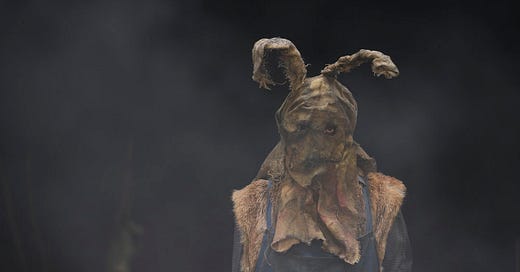‘John Carpenter’s Suburban Screams’ — True Crime Meets Horror in an Unsolved Mysteries-style Docuseries
Real terrors from real people endorsed by a legendary horror auteur.
After more than a decade of hiatus from directing features, John Carpenter returns to his horror roots with Peacock's unscripted 6-part docuseries, John Carpenter’s Suburban Screams. It's a somewhat odd (and safe) choice — considering that in the last 13 years, the auteur has only directed three music videos — but there's some undeniable appeal to it. Though he only directed one episode, shot in Prague, from his couch, the filmmaker also serves as an executive producer and composer for the show. So, the title bearing his name isn't just a PR stunt. But beyond all that, Suburban Screams also has an experimental angle (and a throwback vibe that recalls the eerie spirit of the American documentary series Unsolved Mysteries) that could be tempting for any horror filmmaker looking to make something unconventional.
In essence, Suburban Screams is very much like the previously mentioned NBC show with an additional touch of fright. As an unscripted anthology, the series recounts six separate real-life stories through first-hand accounts, personal archives, and chilling re-enactments. Alongside other directors, Carpenter’s expertise comes into play to provide a vision of these suburban narratives and criminal cases, reimagined in cinematic setups, that aim to create a menacing atmosphere for the harrowing personal accounts. It's an intriguing approach to spice up true stories told by real people, but the end result lacks a visceral quality that could turn them into genuine horror tales.
Out of the three episodes (Kelly, The Bunny Man, Phone Stalker) that were initially provided for review, only one manages to utilize the unusual horror aspect and fulfill its potential to a degree. In Episode 1, Kelly, we’re introduced to a middle-aged man named Dan, who went through a lot of emotional stress, including losing his father to cancer and his ex-girlfriend to addiction in 1999. In the re-enactment part, we see Dan (played by Ben Walton-Jones) coping after those traumas, with a new girlfriend, May (Maria Almeida), on his side and another couple drinking at his house. To liven up the party, Dan brings up the idea of making an Ouija board, which he does, mainly to screw around and prank the girls. But after the joke is up, the four of them decide to take a shot at the thing for real.
In the attempt to summon a spirit, the board spits out a name (Kelly Fitz…), followed by some rumbling noise upstairs. When they all go to investigate, they find a disturbing tower of chairs in the kitchen. At the end of the night, Dan learns that May had a cousin named Kelly Fitzgerald, who went missing after getting involved with drugs and junkies a long time ago. Soon, Dan starts seeing visions of Kelly and becomes obsessed with investigating what really happened to her.
It's a story we heard dozens of times before, but due to the ominous atmosphere, a spooky theme, and Dan's emotional recital of his haunting past, the mystery becomes truly engaging. As he desperately investigates further and further, clues start to pile up, and he gradually comes closer to losing his sanity. Although Kelly's case doesn't get solved entirely, in the end, we get a satisfying, if tragic, closure about what may have happened to her all those years ago.
Episode 4, The Bunny Man, explores the urban legend of a killer in a bunny suit with an axe — which sounds like a bonkers B horror character Hollywood hasn’t adapted y… oh, wait, it has — in Fairfax, Virginia. Relying on the childhood experience of local witnesses and the research of a historian, we slowly uncover what might be the truth about this folklore figure. Undoubtedly, the story is fascinating to some degree, but the re-enactments by amateur actors feel too silly and cheap to provide an apt atmosphere that could add any extra to the first-hand accounts. Ultimately, the Bunny Man legend remains a rather small-scaled city fable with vague roots in reality rather than a story deserving wide attention.
Episode 6, Phone Stalker (directed by Carpenter), oddly is the least engaging and impressive out of the three. It’s a mundane true crime case about a single woman, Beth, getting harassed by an insatiable stalker who’s never been identified or caught. Though her genuinely fearful and upset experience certainly elicits some sympathy from the viewer, the case feels too generic to strike us as something out of the ordinary. It’s also strange why Carpenter would opt to direct this episode in particular when the other stories with supernatural undertones seem more fitting to his style of filmmaking. Phone Stalker also has the worst re-enactments with weak, inexperienced actors who come across as painfully inauthentic. Plus, the story is riddled with dumb decisions and inconsistencies that would perhaps pass in fiction but feel largely unconvincing in a documentary.
Overall, Suburban Screams is an interesting attempt to offer something different during Spooky Season, but it fails to live up to its potential and utilize its concept based on reality. However, if you were an avid fan of Unsolved Mysteries back then, you might find the Peacock series just nostalgic and stirring enough to draw you in for an episode or two.
All six episodes of John Carpenter’s Suburban Screams premieres on Friday, October 13, on Peacock.
Spooky Season is here, and there’s more horror content to come this month, so stay tuned.
If you want to support The Screen, the best way to recommend it to someone who’s into pop culture is by sharing posts like this one above.






Damn it, everything has to be on a service I don't have.
Ohhhh my god. Thank you for alerting me to this!